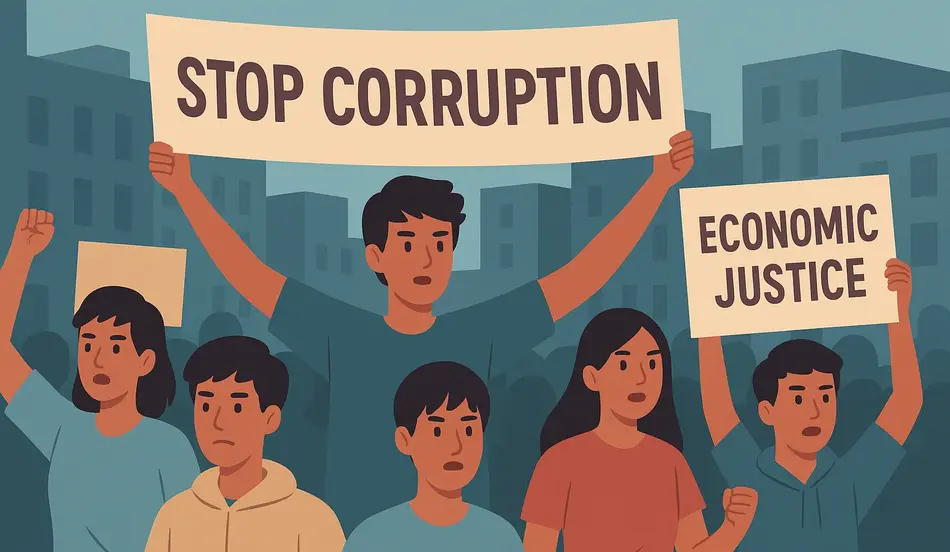Gen Z Asian Protests: Young People Rising Against Corruption and Economic Inequality
In recent years, Gen Z Asian protests have surged across the continent, with young people in countries like Nepal, Indonesia, Bangladesh, and Sri Lanka taking to the streets to demand change. These movements, driven by frustration over economic inequality and rampant corruption, are reshaping the political landscape and challenging the status quo. The focus keyphrase, Gen Z Asian protests, encapsulates a new era of activism where digital natives leverage technology and social media to amplify their voices, even as governments attempt to silence them through bans and censorship.
Understanding the Roots of Gen Z Asian Protests
The rise of Gen Z Asian protests is deeply rooted in economic frustrations and a growing awareness of systemic corruption. In Nepal, youth-led demonstrations have called out government mismanagement and lack of job opportunities. Indonesia has seen waves of student protests against controversial laws perceived as undermining democracy. In Bangladesh, young people have mobilized against corruption scandals and the lack of transparency in public institutions. Sri Lanka’s economic crisis, marked by soaring inflation and shortages, has galvanized a generation that refuses to accept the failures of previous leadership.
Economic Inequality: The Breaking Point
Across Asia, Gen Z faces high unemployment rates, stagnant wages, and limited access to quality education. The COVID-19 pandemic exacerbated these issues, pushing many families into poverty and exposing the fragility of existing social safety nets. As a result, economic inequality has become a rallying cry for young protesters who see little hope for upward mobility under current systems. According to the World Bank, youth unemployment in South Asia remains among the highest globally, fueling discontent and activism.
Corruption and the Generational Divide
Corruption is a persistent issue that has eroded trust in public institutions. Gen Z, with its access to information and global perspectives, is less tolerant of the nepotism and bribery that have long plagued Asian politics. The generational divide is stark: while older generations may accept corruption as a fact of life, young people are demanding accountability and transparency. This divide is evident in the slogans, social media campaigns, and protest art that characterize Gen Z Asian protests.
Take Action: Post Your Job and Empower the Next Generation
Are you looking to hire passionate, driven young professionals? Post your job on WhatJobs today and connect with Gen Z talent ready to make a difference — free for 30 days.
Post a Job Free for 30 Days →The Role of Social Media and Government Response
Social media platforms like Twitter, Instagram, and TikTok have been instrumental in organizing and spreading the message of Gen Z Asian protests. Hashtags, viral videos, and live streams allow activists to bypass traditional media and reach a global audience. However, governments have responded with internet shutdowns and social media bans, attempting to stifle dissent. In Indonesia, authorities have restricted access to platforms during major protests, while Bangladesh and Sri Lanka have implemented similar measures to control the narrative.
Case Studies: Nepal, Indonesia, Bangladesh, and Sri Lanka
In Nepal, the “Enough is Enough” movement saw thousands of young people protest against government inaction during the pandemic. Indonesia’s Omnibus Law protests mobilized students and workers nationwide, leading to clashes with police and widespread arrests. Bangladeshi youth have organized rallies against corruption in the banking sector and demanded reforms in education. Sri Lanka’s economic meltdown in 2022 triggered mass protests, with Gen Z at the forefront, demanding the resignation of top officials and an end to corruption.
Pathways to Solutions: What’s Next for Gen Z Asian Protests?
While the challenges are immense, Gen Z Asian protests have already achieved significant victories, including policy reversals and increased public scrutiny of government actions. Moving forward, sustainable change will require institutional reforms, greater youth participation in politics, and international support for democratic movements. Organizations like Amnesty International have called for the protection of young activists and the right to peaceful assembly.
For more insights on youth activism and career opportunities, explore our articles on Asia Youth Activism, Impact of Social Media on Jobs, and Future of Work in Asia.
Frequently Asked Questions (FAQ) – Gen Z Asian Protests
What are Gen Z Asian protests?
Gen Z Asian protests refer to youth-led movements across Asia where young people demand action against corruption and economic inequality.
Which countries have seen major Gen Z Asian protests?
Nepal, Indonesia, Bangladesh, and Sri Lanka have witnessed significant Gen Z Asian protests in recent years.
What issues drive Gen Z Asian protests?
Key issues include economic inequality, corruption, lack of job opportunities, and government censorship.
How does social media impact Gen Z Asian protests?
Social media enables rapid organization and global awareness, but governments often impose bans to suppress protest movements.
What is the future of Gen Z Asian protests?
The future depends on institutional reforms, youth political participation, and continued advocacy for transparency and equality.
A Young Protester’s Perspective
“My name is Anjali, and I am a 21-year-old student from Kathmandu, Nepal. I joined the Gen Z Asian protests because I was tired of seeing my friends struggle to find jobs and my family suffer from rising prices. When the government tried to silence us by shutting down social media, we found new ways to organize and share our message. We are not just fighting for ourselves, but for a future where honesty and opportunity are possible for everyone. The protests have given me hope that change is possible, even when the odds seem stacked against us.”
Gen Z Asian protests are more than just a moment—they are a movement. As young people continue to rise against corruption and economic inequality, their voices are shaping the future of Asia and inspiring others around the world to demand justice and accountability.




